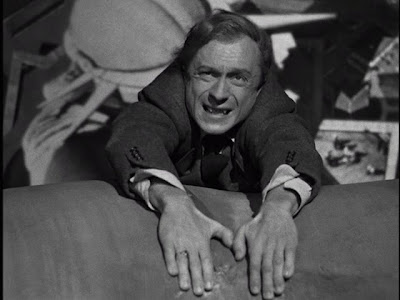In 2007, Dance, Girl, Dance was selected for preservation in the United States National Film Registry as being "culturally, historically, or aesthetically significant", describing it as Arzner's "most intriguing film" and a "meditation on the disparity between art and commerce. The dancers, played by Maureen O'Hara and Lucille Ball strive to preserve their own feminist integrity, while fighting for their place in the spotlight and for the love of male lead Louis Hayward.The inaccuracy of this plot synopsis merely demonstrates that the Library of Congress is just as bad at film criticism as most full-time professionals. I will not recount the plot -- that would waste your time and mine. I only have three observations to make.
First, the major motion picture studios commanded such a wealth of talent, that they could throw an incredible array of top-flight talent at B-level potboiler (and the production suggests that this was a B, although perhaps a B+, a notch above RKO's usual crime melodramas). Besides upcoming stars Maureen O'Hara and Lucille Ball, seen in A productions at RKO, there was Louis Heyward and Ralph Bellamy, cinematographers Russell Metty (Touch of Evil) and Joe August (They Were Expendable), screenwriters Frank Davis and Tess Slessinger, who between them worked on Pride and Prejudice, A Tree Grows In Brooklyn and The Train (1964), not to mention Robert Wise as editor. The main thing with a studio with fixed personnel costs was to keep the most people busy at the same time, so even RKO, the least stable of the studios which owned theaters, had such excess capacity as to engage this level of talent on a programmer.
Which is my second point. The film is not groundbreaking, and fact it's message seems rather confused. Does Lucille Ball's willingness to sell herself, not to the highest bidder but the fastest one, make her a strong independent woman or a two-dollar whore? Is Maureen O'Hara's modesty about her talent naive humility or brutal honesty? Is Louis Hayward a good guy with a drinking problem or he is a user? None of this is made clear in the back-and-forth story which feels like it went through rewrites by people who hadn't read all of the previous draft.
And finally, the moments in the video I've embedded above are probably the only historically valuable moments in the film. The situation is that Lucy Ball is a burlesque star (a Hollywood burlesque star in that she sings a G-rated dirty song and never takes any clothes off) who has hired her frenemy Maureen O'Hara as a stooge to dance some ballet steps and get booed by the audience until she is yanked off and Ball comes on. (The plot of The Night They Raided Minksy's merges those two characters into one) One night, things go differently, and Judy (O'Hara) stops and makes with this startling speech about The Male Gaze. Yet, strong as it is (especially the power of a 19-year-old Maureen O'Hara), it comes virtually out of nowhere. The film doesn't prepare much for this outburst, nor does it follow up its consequences. Sincere, no doubt, on the part of Ms. Arzner and Miss Schlesinger (who was Mrs. Frank Davis), but pasted in, almost like a bookmark indicating another different film that they would have liked to make, if circumstances permitted.
There are two types of classic Hollywood film buffs, the "Great Old Days" fans, who revel in "good old-fashioned entertainment" like Casablanca and The Wizard of Oz and those of us who have binged on this stuff so thoroughly that, willy nilly, we have become students as interested in the missteps and almosts as the unquestioned triumphs. Dance Girl Dance is only for the latter, and maybe only for the three minutes embedded above.
Although I had forgotten that Louis Hayward had a marvelous voice. Have you ever seen The Return of Monte Cristo?





No comments:
Post a Comment